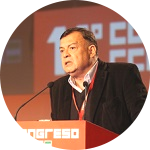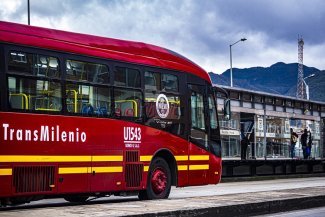It is obvious that there are political and economic elites in Colombia who are reluctant to end the internal armed conflict that has been fought openly for more than 53 years, all with the aim of protecting the interests represented by the far-right politician Álvaro Uribe Vélez. He was president for two terms (2002-2006 and 2006-2010) and still holds the reins of power, albeit behind the scenes, in a government led by Iván Duque since August 2018. Those elites, and especially Uribe, fear justice and do not want the truth about the human rights violations and war crimes committed during his presidency to be known.
Political violence is systematic and affects the exercise of freedom of association. It also prevents workers in Colombia from exercising their rights freely and democratically, because the state does not provide the necessary guarantees. Several of its officials promote a policy of smearing and threatening social leaders and human rights defenders.
After the signing of the Final Agreement to End the Armed Conflict and Build a Stable and Lasting Peace, the government of President Juan Manuel Santos (2010-2018) made a huge effort to convince the international community of the progress made in the peace process. So much so that many international organisations still believe that Colombia is a ‘case in progress’. Nothing could be further from the truth.
Colombia ranks 143 out of 163 nations in the 2019 Global Peace Index, which measures the state of peace in three thematic areas: security and social protection; internal and international active conflicts; and the degree of militarisation.. This ranking indicates that security problems and internal conflicts remain, despite the peace agreement between the Colombian state and the FARC rebels.
According to the third report (April 2019) regarding the Status of Implementation of the Colombian Peace Agreement, after two years of implementation, prepared by the Kroc Institute of the University of Notre Dame in the United States, compliance with rural reform and access to land has progressed by barely 2 per cent, and on public participation, only 13 per cent of the goals have been met. On the subject of commitments in relation to drugs and the substitution of illicit crops, only 2 per cent progress is reported. On victims’ rights, barely 11 per cent progress has been registered, while steps to end the conflict have progressed by 45 per cent, thanks to the demobilisation and reincorporation of the ex-combatants. In short, the FARC has done a lot to fulfil its commitments, while the Colombian state, represented by its government, is not complying with the peace agreement.
The United Nations Secretary General Antonio Gutérres, in his 2019 report to the Security Council, called on “the Government, Congress and all entities to rapidly adopt measures to ensure that the Statutory Law is promulgated as soon as possible, in accordance with the Peace Agreement.” He also said that “the SJP [the Special Jurisdiction for Peace] is the main guarantor of the victims’ rights to truth, justice, reparation and non-repetition.” Meanwhile, the Duque government objected for months to the SJP Regulatory Law and has been obstructing the operation of justice to avoid investigation of the events that occurred during the armed conflict, the clarification of responsibilities and the establishment of penalties.
The government is afraid of justice and truth, because it wants to protect its political chief, Álvaro Uribe, and the local allies who are believed to be responsible for crimes such as extrajudicial executions, forced displacement, land grabs from peasants, and the assassination of protected persons such as social leaders, trade unionists and human rights defenders.
“Why are the killings continuing if a peace agreement has been signed with the guerrilla rebels?”
The fall in the murder rate between 2015 and 2017 was cut short with the arrival of the Duque government. Since 2018, the number of assassinations of trade union and social leaders, human rights defenders as well as ex-FARC combatants has risen.
According to data from the National Trade Union School of Colombia, a total of 702 people from the trade union, social and human rights sectors, as well as ex-FARC combatants (who account for 135 of that total) were assassinated. This overall figure also includes 73 trade unionists since the agreement was signed in November 2016.
According to the report of the United Nations High Commissioner for Human Rights on the human rights situation in Colombia, in 2018 the killings increased by 164 per cent compared to the previous year. The International Committee of the Red Cross reported that the number of victims of forced displacement increased by 90 per cent and the number of victims of anti-personnel mines and explosive devices has tripled since 2018.
A trade unionist who was present at a meeting at the Organisation for Economic Co-operation and Development (OECD) headquarters in Paris heard a Member of the European Parliament (MEP) ask why the killings are continuing if a peace agreement has already been signed with the guerrilla insurgency. Those who know Colombia know that the bloodthirsty, right-wing paramilitaries continue to act with total impunity, threatening and assassinating those who dare to want more democratic relations in the country.
For example, a paramilitary group threatens to kill union leaders because they consider them to be “guerrillas disguised as workers” who want to impose socialism in the country. They gave those who were threatened just 48 hours leave the place or “face the consequences”. Several trade union colleagues continue to receive death threats.
Duque’s government not only minimises these events but shows no signs of being interested in building peace as a historical and structural commitment by Colombian society and its institutions, which has international support from the UN, the European Union, the United States and the international trade union movement. Official justifications, such as that of the Colombian Defence Minister, Guillermo Botero, regarding the murder of ex-guerrilla Dimar Torres reflect their contempt for what is public knowledge.
Worse still, Duque’s security policy is exacerbating the armed conflict, through the reactivation of the paramilitary groups with the complicity of the authorities, which puts human rights, peace and life at serious risk. There is no shortage of data to prove the preceding paragraphs: anyone who takes the time and trouble to read all the updates will come to this same conclusion.
It is urgent, therefore, that we put the peace process in Colombia under the microscope, because in the last two years, instead of making progress, it has gone backwards. The sooner we realise that, and act accordingly, the better it will be for everyone, especially Colombians.
The Duque government must be pressured firmly to take measures to stop the assassinations of trade union leaders, social activists, human rights activists and ex-combatants; to respect and support the institutions of the transitional justice system (SJP, CEV) so that there can be truth, justice and reparations; to maintain the presence of the Verification Mission of the UN Security Council; and expand cooperation actions with communities and territories. Finally, and no less important, the international community must demand the Colombian state’s compliance with its international obligations, including labour standards.









